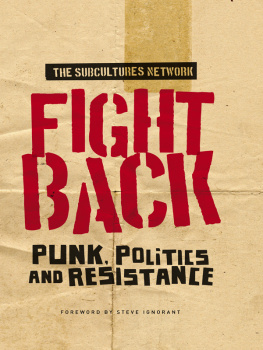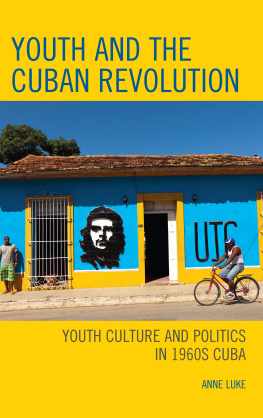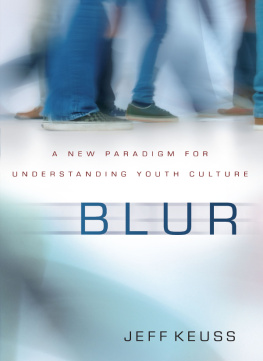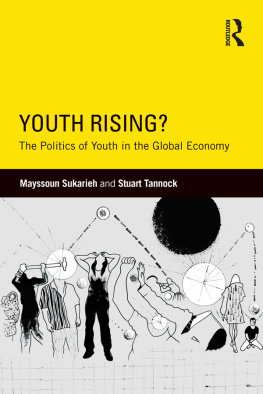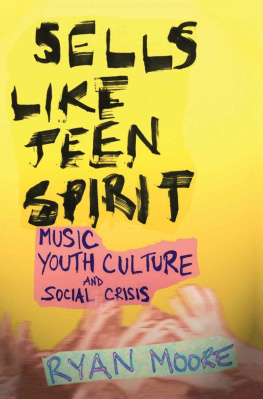
Youth Culture, Popular Music and the End of Consensus
This book examines youth cultural responses to the political, economic and socio-cultural changes that affected Britain in the aftermath of the Second World War. In particular, it considers the extent to which elements of youth culture and popular music served to contest the notion of consensus that historians and social commentators have suggested served to frame British polity from the late 1940s into the 1970s. The collection argues that aspects of youth culture appear to have revealed notable fault-lines in and across British society and provided alternative perspectives and reactions to the presumptions of mainstream political and cultural opinion in the period. This, perhaps, was most acute in the period leading up to and after the seemingly pivotal moment of Margaret Thatchers election to prime minister in 1979.
This book was originally published as a special issue of Contemporary British History.
The Subcultures Network is an interdisciplinary network for the study of subcultures, popular music and social change.
First published 2015
by Routledge
2 Park Square, Milton Park, Abingdon, Oxon, OX14 4RN, UK
and by Routledge
711 Third Avenue, New York, NY 10017, USA
Routledge is an imprint of the Taylor & Francis Group, an informa business
2015 Taylor & Francis
All rights reserved. No part of this book may be reprinted or reproduced or utilised in any form or by any electronic, mechanical, or other means, now known or hereafter invented, including photocopying and recording, or in any information storage or retrieval system, without permission in writing from the publishers.
Trademark notice: Product or corporate names may be trademarks or registered trademarks, and are used only for identification and explanation without intent to infringe.
British Library Cataloguing in Publication Data
A catalogue record for this book is available from the British Library
ISBN 13: 978-1-138-79992-9
Typeset in Minion
by RefineCatch Limited, Bungay, Suffolk
Publishers Note
The publisher accepts responsibility for any inconsistencies that may have arisen during the conversion of this book from journal articles to book chapters, namely the possible inclusion of journal terminology.
Disclaimer
Every effort has been made to contact copyright holders for their permission to reprint material in this book. The publishers would be grateful to hear from any copyright holder who is not here acknowledged and will undertake to rectify any errors or omissions in future editions of this book.
Contents
Jon Garland, Keith Gildart, Anna Gough-Yates, Paul Hodkinson, Bill Osgerby, Lucy Robinson, John Street, Pete Webb & Matthew Worley
Keith Gildart
Bill Osgerby
Matthew Worley
William Lez Henry
Anna Gough-Yates
Lucy Robinson
The chapters in this book were originally published in Contemporary British History, volume 26, issue 3 (September 2012). When citing this material, please use the original page numbering for each article, as follows:
Chapter 1
Introduction: Youth Culture, Popular Music and the End of Consensus in Post-War Britain
Jon Garland, Keith Gildart, Anna Gough-Yates, Paul Hodkinson, Bill Osgerby, Lucy Robinson, John Street, Pete Webb & Matthew Worley
Contemporary British History, volume 26, issue 3 (September 2012) pp. 265271
Chapter 2
From Dead End Streets to Shangri Las: Negotiating Social Class and Post-War Politics with Ray Davies and the Kinks
Keith Gildart
Contemporary British History, volume 26, issue 3 (September 2012) pp. 273298
Chapter 3
Bovver Books of the 1970s: Subcultures, Crisis and Youth-Sploitation Novels
Bill Osgerby
Contemporary British History, volume 26, issue 3 (September 2012) pp. 299331
Chapter 4
Shot By Both Sides: Punk, Politics and the End of Consensus
Matthew Worley
Contemporary British History, volume 26, issue 3 (September 2012) pp. 333354
Chapter 5
Reggae, Rasta and the Role of the Deejay in the Black British Experience
William Lez Henry
Contemporary British History, volume 26, issue 3 (September 2012) pp. 355373
Chapter 6
A Shock to the System: Feminist Interventions in Youth SubcultureThe Adventures of Shocking Pink
Anna Gough-Yates
Contemporary British History, volume 26, issue 3 (September 2012) pp. 375403
Chapter 7
Putting the Charity Back into Charity Singles: Charity Singles in Britain 19841995
Lucy Robinson
Contemporary British History, volume 26, issue 3 (September 2012) pp. 405425
Please direct any queries you may have about the citations to
Keith Gildart is Professor in Labour and Social History at the University of Wolverhampton, UK.
Anna Gough-Yates is Professor and Head of Ealing School of Art, Design and Media at the University of West London, UK. She has written widely on womens magazines and on the relationships between feminism, femininity and popular culture.
William Lez Henry is a social anthropologist, writer and poet. He currently works as Researcher, Consultant and Staff Trainer for Nu-Beyond Ltd: Learning By Choice! He has a keen interest in the counter-cultures of the African Diaspora, especially as recorded through the lens of Reggae music and the Jamaican influence on the African Diaspora. He is a founder member of the National Independent Education Coalition, The Lewisham Black Fathers Support Group and continues to deejay under the moniker Lezlee Lyrix.
Bill Osgerby is Professor of Media, Culture and Communications at London Metropolitan University, UK. His books include Youth in Britain Since 1945 (Blackwell, 1998), Playboys in Paradise: Youth, Masculinity and Leisure-Style in Modern America (Berg/New York University Press, 2001), Youth Media (Routledge, 2004), and a co-edited anthology, Action TV: Tough-Guys, Smooth Operators and Foxy Chicks (Routledge, 2001).
Lucy Robinson is Senior Lecturer in Modern British History at the University of Sussex, UK.
Matthew Worley is Professor of Modern History at the University of Reading, UK. He has published widely on British political history, particularly in relation to the labour movement and the communist movement. He is currently researching the links between youth culture and politics in Britain during the 1970s and 1980s.
Jon Garland, Keith Gildart, Anna Gough-Yates, Paul Hodkinson, Bill Osgerby, Lucy Robinson, John Street, Pete Webb & Matthew Worley
Modern British historians have rarely shown much interest in questions of youth, youth culture or popular music. the politics and cultural pursuits of youth have more typically been left to writers from other academic disciplines to explain or assess: to sociologists, political scientists, criminologists and cultural studies. The time has surely come, therefore, for historians to take youth seriously; to seek to contextualise and understand the ways in which young people have navigated their way to adulthood through the dramatically changing socio-economic and political contours of the twentieth century. Indeed, we would go so far as to argue that the study of youth and youth culture provides an opportunity to uncover important aspects of social and political change, be they mediated through consumption, the construction of identity, the production of popular music, or in terms of providing a space beyond the family, school and workplace in which formative cultural and political interests and perspectives are developed.


